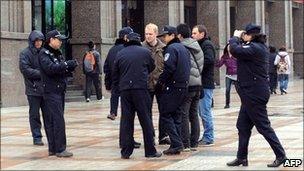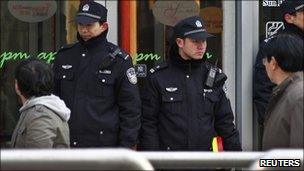Calls for protests in China met with brutality
- Published
The BBC's Damian Grammaticas and his cameraman were stopped from filming in Beijing
The time was about 1330. Lines of Chinese police stood at the entrance to Wangfujing, Beijing's most famous shopping street.
The authorities' anxiousness was palpable.
Dozens of police vans were parked on the roadside, uniformed men with dogs patrolled up and down, street cleaning vans drove up and down spraying water to keep people away, and a sudden rash of suspiciously unnecessary street repairs meant big hoardings had been put up.
It would have been farcical if it hadn't turned so brutal.
The reason for all this nervousness was the call that had gone out over the internet for Chinese people to stage their own "Jasmine Protests", copying the wave of democratic revolutions in the Middle East and north Africa.
The police were monitoring everyone going into the pedestrian zone. But unable to distinguish the protesters, who'd been called to "stroll" peacefully and silently past McDonald's restaurant at 1400, from genuine shoppers they focussed on picking out foreign reporters and cameramen.
Targeted campaign
A similar call a week ago had brought out just a handful of protesters. Since then stepped-up internet controls have been blocking any mention of the word "jasmine".
So relatively few people in China even know the call for protests has been made.

One cameraman was set upon by five men who punched him in the face
There has also been a deliberate and targeted campaign to round up lawyers, activists, and bloggers, around a hundred people in total. Some have been detained, some disappeared, others threatened.
A few, who seem to have reposted internet messages calling for peaceful gatherings, face extremely serious subversion charges.
We were immediately singled out. Uniformed officers blocked our way a few hundred yards from McDonald's and demanded our press cards. Nervously they talked into mobile phones and handheld radios.
They stalled us, then barked at us to stop filming. Plainclothes men came and stood right in front of our camera so we couldn't take shots.
Urgent meeting
Ahead of this event there was a clear sign the police were on edge.
On Friday officers had called our news bureau, and many others in Beijing, to summon us for an urgent meeting.
We were warned that we must follow China's reporting rules. Again on Saturday phone calls were made to BBC staff and other journalists with more warnings.
China's reporting rules allow us to film on the street. For interviews we must seek the consent of interviewees. We stuck well within the rules. Even when the police blocked us without explanation we co-operated.
All around us it was obvious that at least half the people on the street were plainclothes state security officers. Some were snapping photographs of everyone, others were videoing everything, many had obvious earpieces plugged in and were mumbling on their radios.
There must have been hundreds of them. China has been pouring money into its domestic security apparatus in recent years and this is what it is for.
Then suddenly, a few minutes before 2pm, the crucial time for the "Jasmine" protests, the plainclothes thugs waded in.
Security goons
Without warning they shoved and pushed the BBC's cameraman. They grabbed at his camera and tried to rip it from his hands, bundling him a full 50 yards into a police van. They had earpieces in and were also taking orders.
Then the thugs turned on me. My hair was grabbed and pulled by one of the state security goons.
They tried to pick me up and throw me bodily into the van.
I found myself lying on the floor as they repeatedly slammed the door on my leg which was still part of the way out of the truck, one, two, three times, maybe more. A few shoppers looked on in confusion.
The same thugs climbed into the van and threatened us again as we were driven to a nearby government office. Our details were taken and we were told we could not do interviews in the area because of "special circumstances".
Asked what the special circumstances were they ignored the question. And when told we did not want to do interviews, only take pictures, they again ignored us.
There were more foreign journalists there too. But it seems we got off lightly. One cameraman was set upon by five men who kicked, and punched him in the face, he had to go to hospital for treatment; another had his hand injured.
It was brutal and totally out of proportion to the situation.
It all seems to be evidence that China's Communist Party chiefs have been spooked by the popular protests sweeping the Middle East.
In those democratic revolutions ranks of ordinary people from developing countries have been rising against the autocracies that have monopolised power.
Tapping into fears
Many see parallels in China, also a developing nation with an authoritarian government, where calls for an end to corruption, to nepotism, to one party's monopoly on power all might find resonance.

As well as the police presence there were plainclothes state security officers
China's Communist rulers often say democracy is a western idea unsuited to China's level of development. It's an argument that is challenged by what's been happening on the streets of Cairo, Tunis and elsewhere.
There are many reasons why a similar uprising seems highly unlikely in China.
The economy is growing, people generally believe life is getting better, the Communist Party keeps refreshing its leadership every decade, and it keeps spending vast amounts on internal security.
But the revolts in the Middle East do seem to have tapped into fears felt in China's leaders and its security apparatus.
Otherwise you have to ask, what explanation is there for sending the thugs to drag away and beat up journalists looking to take a few pictures of people strolling silently past McDonald's on a Sunday afternoon?
Strange this happened the day after China voted to support UNSC resolution 1970 condemning Col Gaddafi's response to protests in Libya. I thought the Chinese were opening up to the idea of the worldwide reporting that often comes with peaceful protests. It has certainly set China back in my eyes, maybe by as much as 10 years. (Nick, UK)
The only protesters are foreign journalists looking for a story. Pointing a camera and shoving microphones into shoppers' faces asking questions about people's opinion of the "jasmine revolution" in the Middle East and provoking a response from the police, then complain about police brutality? Come on, what did you expect? (Simon, UK)
Well done China, giving the pretentious Mr Grammaticas the respect that he deserves! I wonder how the authorities in the UK would react if Chinese-based websites started organising a campaign to overthrow the establishment here? (Sampan, UK)
I have always had this strong feeling that the Chinese government faces it greatest threat from within. This report is a clear indicator that the Chinese government seems to think so too. If the winds of change can blow through the repressive Middle East, I am optimistic enough to believe that a time will come when the Chinese people will rise up and revolt against their masters and China will have to face up to the idea of a democracy. (Melanie, India)
I don't think the kind of waves will come in China because Chinese people are fast becoming wealthier. They don't need democracy like that of Western world. (Naresh)
I don't think that such a 'revolution' will do any good to a country like ours. Neither do I understand the motivation of those of my countrymen, some of whom are naive intellectuals, to protest... Our leadership has been doing a good job... Don't forget China has 1.3 billion people whose life have been improving steadily in the past decades, and the issue of disparity is being addressed seriously. For those reporters who don't really know China, do your homework. Every country has its problems, which cannot be solved overnight. China is no exception. People like me will suffer most if there is a revolution-induced chaos. (CJ, China)
What the Chinese government doesn't seem to realise though is that people are talking, even if they aren't acting, and it is the student body that is starting to tremble. You can almost feel it happening - the lack of job prospects, the inflation, and the lack of media freedoms are starting a groundswell in China that the government will be hard pressed to stop short of another Tiananmen Square Massacre. (Rob, China)
The sooner democracy and respect for human rights reaches China the better.The whole world should be fighting for Chinese democracy. China's rise will have consequences for all, and if the heads of power cannot respect human life and continue to rule with an iron fist how is one to interpret the future? Rather bleakly - would you not agree? (Lee, UK)